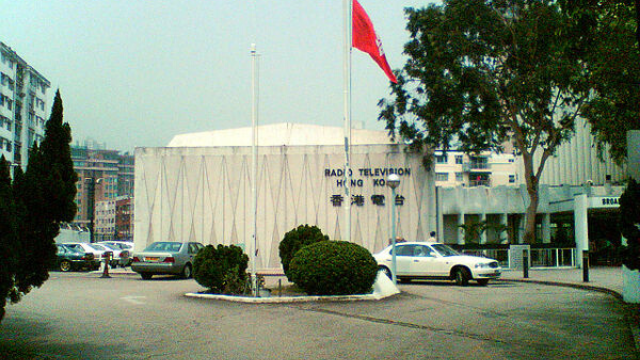
Hong Kong government broadcaster RTHK on Tuesday axed a top satirical show that poked fun at police denials of violence against pro-democracy protesters, and apologized, saying some archived episodes will also be removed.
RTHK issued an announcement apologizing “to anyone offended by the station’s output in recent months,” and announcing the suspension of the popular Chinese-language satirical show “Headliner.”
The move came shortly after the government’s Communications Authority issued a warning to RTHK for “denigrating and insulting” the police in a February episode of the show.
“The situation is very serious given that RTHK, as a public service broadcaster, has been repeatedly ruled to have breached the various provisions in the [Television Programme] Code, including failure to ensure the accuracy of the factual contents in the programme; remarks and content regarded as hate speech, denigrating and insulting the police; and failure to include a sufficiently broad range of views in the personal view programme,” the media regulator said in a statement posted to the government’s website on Tuesday.
The authority then demanded a full review of RTHK’s programme production and editorial processes and called for any staff found to have committed “negligence or errors” to be disciplined.
Production of “Headliner,” which has been aired since 1989, and which also included satire targeting British colonial-era officials and politicians, will be suspended when the current season comes to an end, it said.
A spokeswoman said RTHK accepts Tuesday’s ruling by the Communications Authority and will “seriously follow up” on its findings.
She said RTHK “would like to apologise to any police officers or others who have been offended, or who are dissatisfied with the station’s output.”
An international outcry
Hong Kong’s police force have sparked an international outcry among medics, human rights watchdogs, overseas lawmakers, and governments over their handling of the anti-extradition movement, which expanded into a full-blown civil disobedience campaign for fully democratic elections and an inquiry into police violence.
Rights groups say the use of “non-lethal” weapons on protesters, the majority of whom have been peaceful, have far exceeded international norms.
Meanwhile, police have repeatedly said that any reports of violence by frontline officers; of missing, sexually abused, or otherwise mistreated protesters; and fears that people may have died in Prince Edward MTR station during a violent attack by riot police, are fake news, “spread by a small minority of people online.”
And the satirists on “Headliner” who made fun of the police denials in a fateful episode aired in February later became the target of police complaints themselves.
TV personality Wong He, who presents the satirical political show “Headliner,” said in an interview shortly after the episode aired that the police complaint that the show had misled the audience was unfounded.
‘”We stuck to the facts; we just presented them in a certain way,” Wong told RFA. “If it’s now a crime to tell a story based on the facts, then it’s not just the people at ‘Headliner” who need to worry.”
Asked why he continues to work in satire in a deteriorating environment for press freedom in Hong Kong, Wong said: “To make those in power who did wrong feel very uncomfortable: to make them stop and think and maybe even mend their ways.”
“If I just pretended that everything was fine when they did something wrong what would be the point of that?”
Other public figures targeted
Other public figures aligned with the protest movement have been targeted by pro-China media and public figures with outright smear campaigns, including pro-democracy lawmaker Lam Cheuk-ting.
“People are making fun of Chinese leaders and the fight against the coronavirus, and yet our government is so uptight that it has to complain?” a Hong Kong resident said in a street interview conducted by RFA.
“Why would they care what people say if they didn’t do anything wrong?”
According to Fu King-wa, a journalism professor at the University of Hong Kong, the city has entered an era of unprecedented mistrust.
“There was a time when we would believe anything the government told us,” Fu said in an interview linked to the complaints against “Headliner” in February. “But now, public trust in the government and in law enforcement agencies is at an all-time low.”
And the people on the streets of Hong Kong interviewed before “Headliner” was canceled seem to agree with him.
“I don’t pay them any heed at all now because I know for sure they’re lying,” said one young man. “I don’t believe a word Carrie Lam says [and] I’ve stopped watching those briefings.”
“Nobody in our generation trusts them,” a young woman said. “No way!”
A third interviewee agreed. “I have no trust left in the government,” he said.
‘Fake news, random smears’
Meanwhile, Hong Kong Police Commissioner Chris Tang has dismissed genuine reports of police violence and questions about missing protesters or possible deaths as “fake news.”
“There’s been a lot of fake news lately in the media, fake news, fake video trying to whip up hatred in society,” Tang told a news conference in February.
“Some people have been faking up photos to smear the Hong Kong police force and to destroy public trust in the police,” he said.
“We want to run a clean operation, and we will listen to rational criticism, but we won’t put up with random smears,” he said.
Fu said the attitude is exactly the same among the officials in Lam’s administration.
“The government dismisses any doubts or concerns about its actions as fake news,” he said. “Every time: ‘Oh, it’s fake news.'”
“Police Commissioner Chris Tang just said that all the media reports about police violence were fake, but they were all reasonable and well-founded reports,” Fu said.
“It was totally wrong to call them fake news.”
Reported by Gigi Lee and Tam Siu-yin for RFA’s Cantonese Service. Translated and edited by Luisetta Mudie.
Source: Copyright © 1998-2016, RFA. Used with the permission of Radio Free Asia, 2025 M St. NW, Suite 300, Washington DC 20036. https://www.rfa.org.












